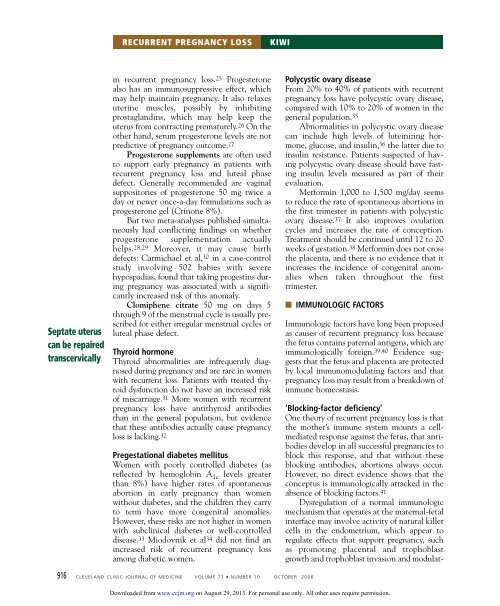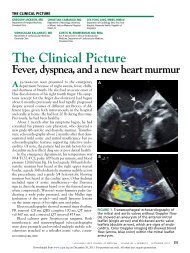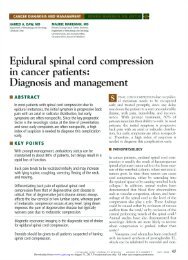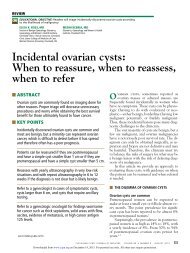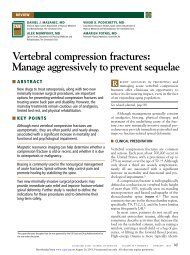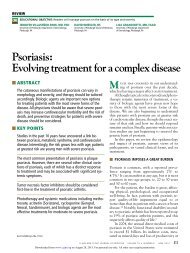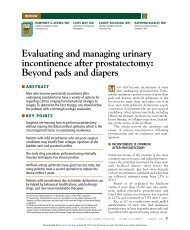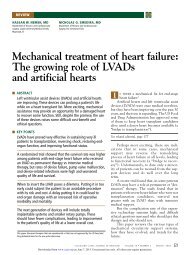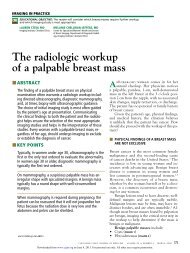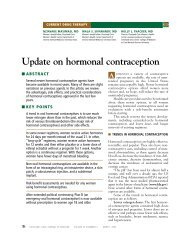Recurrent pregnancy loss: Evaluation and discussion of the causes ...
Recurrent pregnancy loss: Evaluation and discussion of the causes ...
Recurrent pregnancy loss: Evaluation and discussion of the causes ...
Create successful ePaper yourself
Turn your PDF publications into a flip-book with our unique Google optimized e-Paper software.
RECURRENT PREGNANCY LOSS<br />
KIWI<br />
Septate uterus<br />
can be repaired<br />
transcervically<br />
in recurrent <strong>pregnancy</strong> <strong>loss</strong>. 25 Progesterone<br />
also has an immunosuppressive effect, which<br />
may help maintain <strong>pregnancy</strong>. It also relaxes<br />
uterine muscles, possibly by inhibiting<br />
prostagl<strong>and</strong>ins, which may help keep <strong>the</strong><br />
uterus from contracting prematurely. 26 On <strong>the</strong><br />
o<strong>the</strong>r h<strong>and</strong>, serum progesterone levels are not<br />
predictive <strong>of</strong> <strong>pregnancy</strong> outcome. 27<br />
Progesterone supplements are <strong>of</strong>ten used<br />
to support early <strong>pregnancy</strong> in patients with<br />
recurrent <strong>pregnancy</strong> <strong>loss</strong> <strong>and</strong> luteal phase<br />
defect. Generally recommended are vaginal<br />
suppositories <strong>of</strong> progesterone 50 mg twice a<br />
day or newer once-a-day formulations such as<br />
progesterone gel (Crinone 8%).<br />
But two meta-analyses published simultaneously<br />
had conflicting findings on whe<strong>the</strong>r<br />
progesterone supplementation actually<br />
helps. 28,29 Moreover, it may cause birth<br />
defects: Carmichael et al, 30 in a case-control<br />
study involving 502 babies with severe<br />
hypospadias, found that taking progestins during<br />
<strong>pregnancy</strong> was associated with a significantly<br />
increased risk <strong>of</strong> this anomaly.<br />
Clomiphene citrate 50 mg on days 5<br />
through 9 <strong>of</strong> <strong>the</strong> menstrual cycle is usually prescribed<br />
for ei<strong>the</strong>r irregular menstrual cycles or<br />
luteal phase defect.<br />
Thyroid hormone<br />
Thyroid abnormalities are infrequently diagnosed<br />
during <strong>pregnancy</strong> <strong>and</strong> are rare in women<br />
with recurrent <strong>loss</strong>. Patients with treated thyroid<br />
dysfunction do not have an increased risk<br />
<strong>of</strong> miscarriage. 31 More women with recurrent<br />
<strong>pregnancy</strong> <strong>loss</strong> have antithyroid antibodies<br />
than in <strong>the</strong> general population, but evidence<br />
that <strong>the</strong>se antibodies actually cause <strong>pregnancy</strong><br />
<strong>loss</strong> is lacking. 32<br />
Pregestational diabetes mellitus<br />
Women with poorly controlled diabetes (as<br />
reflected by hemoglobin A 1c levels greater<br />
than 8%) have higher rates <strong>of</strong> spontaneous<br />
abortion in early <strong>pregnancy</strong> than women<br />
without diabetes, <strong>and</strong> <strong>the</strong> children <strong>the</strong>y carry<br />
to term have more congenital anomalies.<br />
However, <strong>the</strong>se risks are not higher in women<br />
with subclinical diabetes or well-controlled<br />
disease. 33 Miodovnik et al 34 did not find an<br />
increased risk <strong>of</strong> recurrent <strong>pregnancy</strong> <strong>loss</strong><br />
among diabetic women.<br />
Polycystic ovary disease<br />
From 20% to 40% <strong>of</strong> patients with recurrent<br />
<strong>pregnancy</strong> <strong>loss</strong> have polycystic ovary disease,<br />
compared with 10% to 20% <strong>of</strong> women in <strong>the</strong><br />
general population. 35<br />
Abnormalities in polycystic ovary disease<br />
can include high levels <strong>of</strong> luteinizing hormone,<br />
glucose, <strong>and</strong> insulin, 36 <strong>the</strong> latter due to<br />
insulin resistance. Patients suspected <strong>of</strong> having<br />
polycystic ovary disease should have fasting<br />
insulin levels measured as part <strong>of</strong> <strong>the</strong>ir<br />
evaluation.<br />
Metformin 1,000 to 1,500 mg/day seems<br />
to reduce <strong>the</strong> rate <strong>of</strong> spontaneous abortions in<br />
<strong>the</strong> first trimester in patients with polycystic<br />
ovary disease. 37 It also improves ovulation<br />
cycles <strong>and</strong> increases <strong>the</strong> rate <strong>of</strong> conception.<br />
Treatment should be continued until 12 to 20<br />
weeks <strong>of</strong> gestation. 38 Metformin does not cross<br />
<strong>the</strong> placenta, <strong>and</strong> <strong>the</strong>re is no evidence that it<br />
increases <strong>the</strong> incidence <strong>of</strong> congenital anomalies<br />
when taken throughout <strong>the</strong> first<br />
trimester.<br />
■ IMMUNOLOGIC FACTORS<br />
Immunologic factors have long been proposed<br />
as <strong>causes</strong> <strong>of</strong> recurrent <strong>pregnancy</strong> <strong>loss</strong> because<br />
<strong>the</strong> fetus contains paternal antigens, which are<br />
immunologically foreign. 39,40 Evidence suggests<br />
that <strong>the</strong> fetus <strong>and</strong> placenta are protected<br />
by local immunomodulating factors <strong>and</strong> that<br />
<strong>pregnancy</strong> <strong>loss</strong> may result from a breakdown <strong>of</strong><br />
immune homeostasis.<br />
‘Blocking-factor deficiency’<br />
One <strong>the</strong>ory <strong>of</strong> recurrent <strong>pregnancy</strong> <strong>loss</strong> is that<br />
<strong>the</strong> mo<strong>the</strong>r’s immune system mounts a cellmediated<br />
response against <strong>the</strong> fetus, that antibodies<br />
develop in all successful pregnancies to<br />
block this response, <strong>and</strong> that without <strong>the</strong>se<br />
blocking antibodies, abortions always occur.<br />
However, no direct evidence shows that <strong>the</strong><br />
conceptus is immunologically attacked in <strong>the</strong><br />
absence <strong>of</strong> blocking factors. 41<br />
Dysregulation <strong>of</strong> a normal immunologic<br />
mechanism that operates at <strong>the</strong> maternal-fetal<br />
interface may involve activity <strong>of</strong> natural killer<br />
cells in <strong>the</strong> endometrium, which appear to<br />
regulate effects that support <strong>pregnancy</strong>, such<br />
as promoting placental <strong>and</strong> trophoblast<br />
growth <strong>and</strong> trophoblast invasion <strong>and</strong> modulat-<br />
916 CLEVELAND CLINIC JOURNAL OF MEDICINE VOLUME 73 • NUMBER 10 OCTOBER 2006<br />
Downloaded from www.ccjm.org on August 29, 2013. For personal use only. All o<strong>the</strong>r uses require permission.


